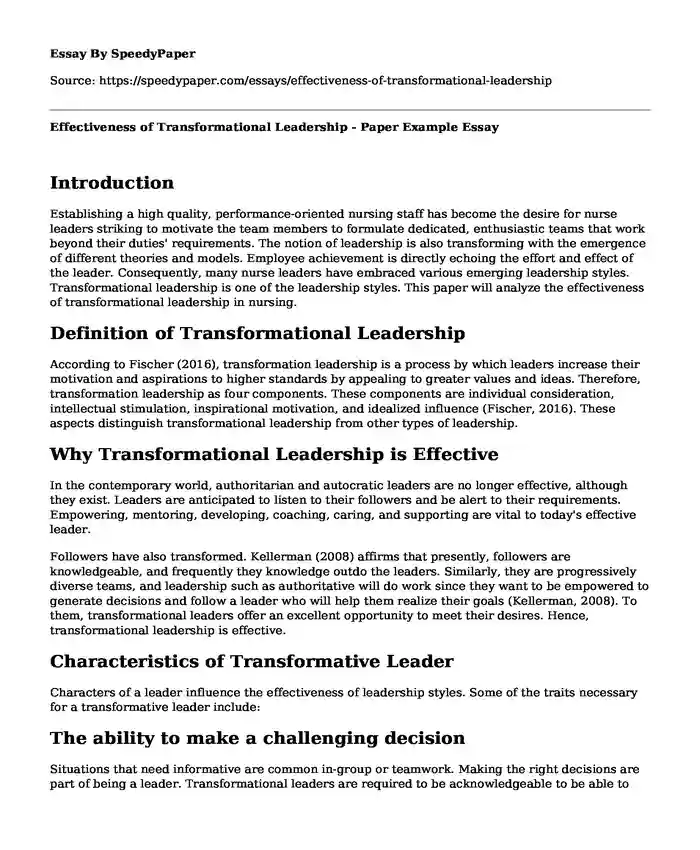
| Type of paper: | Essay |
| Categories: | Leadership analysis Healthcare Transformational leadership |
| Pages: | 3 |
| Wordcount: | 681 words |
Introduction
Establishing a high quality, performance-oriented nursing staff has become the desire for nurse leaders striking to motivate the team members to formulate dedicated, enthusiastic teams that work beyond their duties' requirements. The notion of leadership is also transforming with the emergence of different theories and models. Employee achievement is directly echoing the effort and effect of the leader. Consequently, many nurse leaders have embraced various emerging leadership styles. Transformational leadership is one of the leadership styles. This paper will analyze the effectiveness of transformational leadership in nursing.
Definition of Transformational Leadership
According to Fischer (2016), transformation leadership is a process by which leaders increase their motivation and aspirations to higher standards by appealing to greater values and ideas. Therefore, transformation leadership as four components. These components are individual consideration, intellectual stimulation, inspirational motivation, and idealized influence (Fischer, 2016). These aspects distinguish transformational leadership from other types of leadership.
Why Transformational Leadership is Effective
In the contemporary world, authoritarian and autocratic leaders are no longer effective, although they exist. Leaders are anticipated to listen to their followers and be alert to their requirements. Empowering, mentoring, developing, coaching, caring, and supporting are vital to today's effective leader.
Followers have also transformed. Kellerman (2008) affirms that presently, followers are knowledgeable, and frequently they knowledge outdo the leaders. Similarly, they are progressively diverse teams, and leadership such as authoritative will do work since they want to be empowered to generate decisions and follow a leader who will help them realize their goals (Kellerman, 2008). To them, transformational leaders offer an excellent opportunity to meet their desires. Hence, transformational leadership is effective.
Characteristics of Transformative Leader
Characters of a leader influence the effectiveness of leadership styles. Some of the traits necessary for a transformative leader include:
The ability to make a challenging decision
Situations that need informative are common in-group or teamwork. Making the right decisions are part of being a leader. Transformational leaders are required to be acknowledgeable to be able to make an informed decision. Further, challenging decisions are arrived easily by aligning the decision-making process with well-defined values, visions, and team goals.
Willing to take the right risks:
Any leader can take a risk. Nevertheless, Hall, Johnson, Wysocki, and Kepner (2002) confirm that transformational leaders take well-calculated risks that, more often than not, led to positive results. To be able to be in the right direction, it is essential to obey ones’ instincts and gather information from team members to build intelligence.
Transformational leaders are adjustable and innovative.
Good transformational leaders comprehend business dynamics and are normally find innovative approaches to gain a competitive edge. In addition, they are not afraid to change traditional techniques that were effective in the past as they look forward to the future and what future demands.
Weaknesses of Transformational Leadership
Even though transformational leaders are considered effective leaders, one key shortcoming, according to Hall, Johnson, Wysocki, and Kepner (2002), are that they use impression management in their leadership. Impression management can lead to the self-promotion of leaders. Besides that, transformation leadership is not universally applicable.
The healthcare system is dynamic and progressively changing; hence, nurse leaders need to adopt a leadership style that enables them to embrace the changes and work towards the organizational goal. Transformational leadership is one of the most effective leadership approaches to attain this. A transformational leader motivates followers and develops a sense of commitment amongst them. The four-element of transformational leadership that effectively includes intellectual stimulation, inspiration, motivation, individualized consideration, and idealized influence.
References
Fischer, S. A. (2016). Transformational leadership in nursing: a concept analysis. Journal of advanced nursing, 72(11), 2644-2653. https://onlinelibrary.wiley.com/doi/epdf/10.1111/jan.13049
Hall, J., Johnson, S., Wysocki, A., & Kepner, K. (2002). Transformational leadership: The transformation of managers and associates. University of Florida IFAS Extension. http://citeseerx.ist.psu.edu/viewdoc/download?doi=10.1.1.515.6917&rep=rep1&type=pdf
Kellerman, B. (2008). How followers are creating change and changing leaders. Boston, MA: Harvard School Press. https://static1.squarespace.com/static/5df3bc9a62ff3e45ae9d2b06/t/5e4c5f97e872c67900f3d204/1582063514325/Followership+-+Kellerman.pdf
Cite this page
Effectiveness of Transformational Leadership - Paper Example. (2023, Dec 29). Retrieved from https://speedypaper.net/essays/effectiveness-of-transformational-leadership
Request Removal
If you are the original author of this essay and no longer wish to have it published on the SpeedyPaper website, please click below to request its removal:
- Free Essay Sample on Diagnostic Medical Sonography
- Free Essay: Non-Conventional Practices in Healthcare
- Free Essay with the Case Study on Breast Pain
- Sarcoidosis, Essay Sample on the Disease
- Free Essay with a Critical Analysis of Mr. P's Case Study
- How is the Corona Virus Affecting Our Daily Lives? - Essay Sample
- Essay Sample on The Role of Healthcare Cost and Utilization Project
Popular categories




